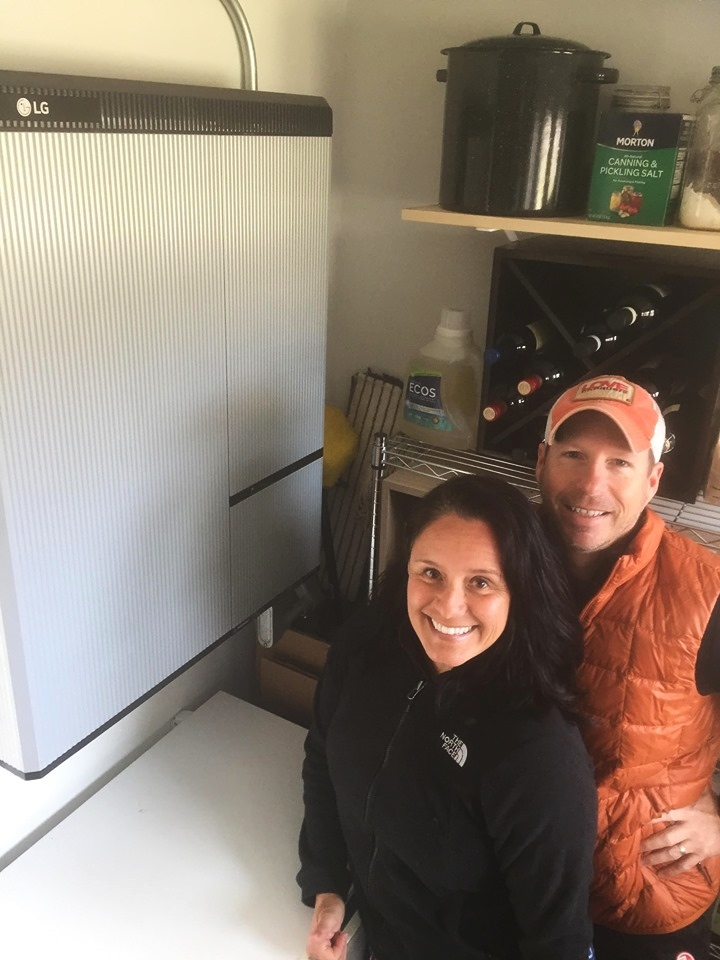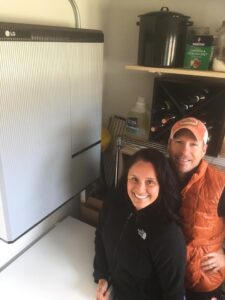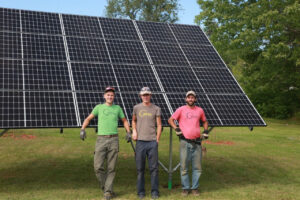
25 Oct Should I Install Batteries on my Solar System?
 Solar energy systems with batteries have skyrocketed in popularity in the last decade. Lithium-ion batteries have increased in capabilities while prices have fallen. Solar battery storage offer greater resiliency during grid outages, especially in areas in Maine with an unstable electric grid.
Solar energy systems with batteries have skyrocketed in popularity in the last decade. Lithium-ion batteries have increased in capabilities while prices have fallen. Solar battery storage offer greater resiliency during grid outages, especially in areas in Maine with an unstable electric grid.
Whereas lithium-ion batteries have been unaffordable to most, this trend is quickly changing. Installing an advanced energy storage system on a house now adds about $8,000 to $20,000 on the price of the solar system compared to a solar system without batteries. The price varies depending on the battery manufacturer and power needs of the house.
Although the Tesla Powerwall gained considerable media attention in recent years, numerous solar battery manufacturers make quality residential and small commercial batteries. Sundog Solar installs several different solar batteries, including the LG Chem and Tesla Powerwall. We customize each installation to the customer’s unique needs and the project budget.
Blackouts and solar energy
Unfortunately, solar panels without batteries do not operate during a grid outage. Solar systems without batteries automatically shut down during a blackout to protect the safety of utility workers. Thus, battery backup is required to keep the lights on during a power outage.
Sundog Solar installs a critical load panel to determine which electronics and appliances get power from the batteries. We work with you to prioritize which loads are most essential until utility power is restored. For example, people with a home office may prioritize computers and communication equipment. Homes with aquariums may need to keep them properly heated.
 This is because batteries have a limited energy storage capacity, which is more of an issue in cloudy weather or at night. We typically recommend not powering certain circuits that use a lot of power but are not essential because they will exhaust the batteries more quickly. For example, it might be more urgent to keep the refrigerator on to prevent food from spoiling than to power an electric water heater. Essential medical equipment might be more crucial than the air conditioner. Sump pumps can help prevent basements from flooding during intense storms. Many Maine homes are without heat during power outages, even though they would need little power to keep the propane or oil boiler or furnace running.
This is because batteries have a limited energy storage capacity, which is more of an issue in cloudy weather or at night. We typically recommend not powering certain circuits that use a lot of power but are not essential because they will exhaust the batteries more quickly. For example, it might be more urgent to keep the refrigerator on to prevent food from spoiling than to power an electric water heater. Essential medical equipment might be more crucial than the air conditioner. Sump pumps can help prevent basements from flooding during intense storms. Many Maine homes are without heat during power outages, even though they would need little power to keep the propane or oil boiler or furnace running.
Solar battery features
Sundog Solar installs two main types of batteries: deep-cycle lead-acid and lithium-ion. Key features are the battery’s capacity, power ratings, warranty, required maintenance, and depth of discharge.
The capacity measures how much energy the battery can hold and is measured in kilowatt-hours. The power rating measures the amount of electricity a battery can supply at a given time. The depth of discharge relates to how much of its capacity can be drained relative to the total. To ensure product longevity, don’t exceed the depth of discharge of the battery (as specified by the manufacturer).
Should I get batteries for my solar system?
Deciding whether or not to get solar batteries depends on several factors. Before deciding, consider if:
- It is essential to backup power during outages.
- The power grid is unstable in your area and is prone to extended outages.
- A backup generator is an appealing option (disadvantages including noise, space, servicing, cost, and fossil fuel use)
The price of lithium-ion batteries has plummeted in recent years, and the technology has advanced. The federal tax credit is calculated based on the total solar system cost, including batteries. Thus, there are potential tax advantages to getting a solar system with batteries installed before the end of 2021.


